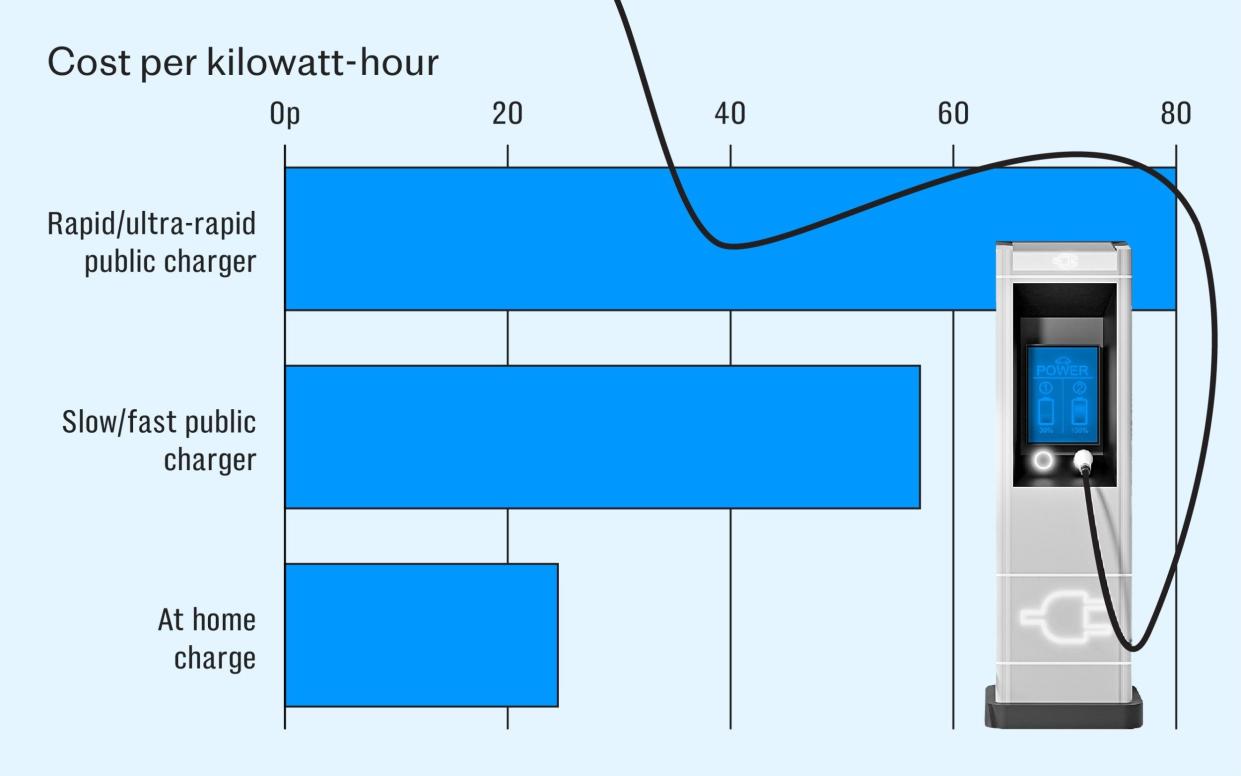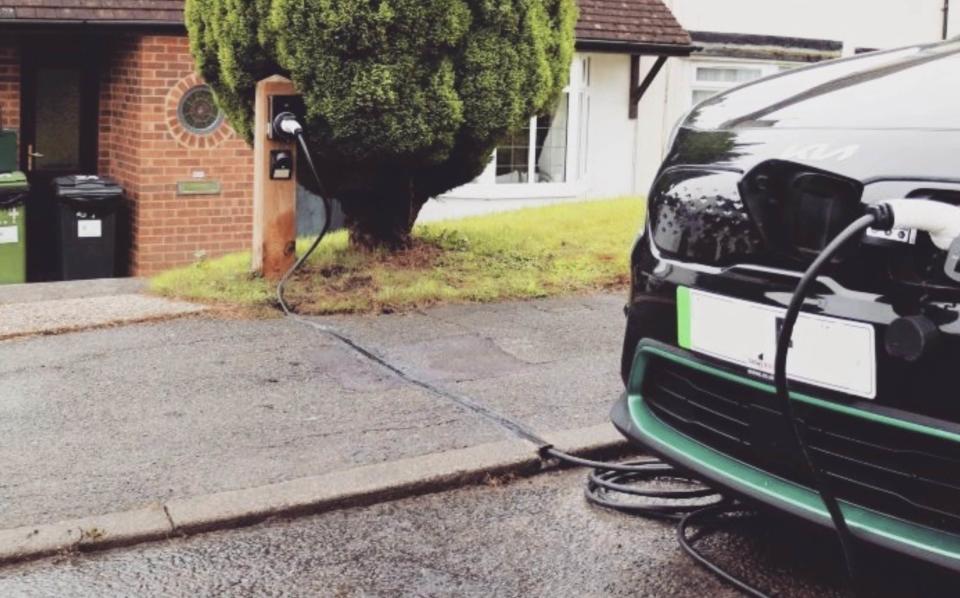The electric car ‘driveway divide’ that could ramp up the cost of charging

Michael Goulden still remembers the nerve-wracking experience of charging an electric vehicle for the first time outside his family’s terraced home in North London.
Frustrated by the sky-high cost of public chargers, he had resorted to running a cable out the window and down across the pavement so his Volkswagen ID4 could power up overnight.
“You feel uncomfortable doing it. You go to bed at night and think, ‘It’s a very low chance but there’s a small likelihood someone’s going to trip over in the night, and I’m going to get a personal injury claim’,” he recalls. “I felt so uncomfortable I haven’t done it since.”
Many other electric vehicle drivers are willing to take the risk to reap the savings of home charging.
Somewhere between 30pc to 40pc of households do not have off-street parking, rising to 60pc in London, according to analysis of charging locations by installer Andersen.
This “driveway divide” can make owning an EV significantly more expensive for those without: the typical cost of charging at home is 24 pence per kilowatt hour (kWh), compared with an average of 80 pence per kWh at public chargers, according to information provider Zap Map.
For many electric cars, that amounts to a difference of more than £20 for a full charge – creating a huge incentive to charge at home where possible.
As a result, drivers have resorted to desperate measures: running extension leads from their home across the pavement – sometimes protected by ramps or coverings – or running them out of a first floor window and then down to the road via nearby lamp posts and trees.
“When it’s such a big difference, people are going to do it,” Goulden says.
Giles Coren is among them. The restaurant critic has said there was no other practical way to keep his Jaguar I-PACE powered up, blaming poor public charger provision in his home borough of Camden.
“I put a cable out of the window, causing a great security breach, run it across the pavement and put mats over it which the dogs p--- on,” he said in 2022.
“I’m not bothered it’s against the law. How the f--- else are you meant to?”
Goulden took matters into his own hands: his answer was to start his own business, Kerbo Charge, to sell pavement “gullies” for housing EV charge cables.
Rather than running cables over the surface of pavements – creating the risk that people may trip on them – gullies are plastic channels embedded in the pavement. They safely conceal the wire between the owner’s property and their car, removing the hazard.

Kerbo Charge is just one of a plethora of companies offering solutions to people without driveways who want to go electric.
For example, Shell-owned Ubitricity is converting lamp posts themselves into EV charging stations, while Dutch start-up ChargeArm has developed a retractable arm that reaches high over the pavement to dangle a cable down to the car. In Nottingham, pads set into the road surface that charge taxis wirelessly have been trialled.
However, despite this entrepreneurial boom, many EV drivers face a postcode lottery when it comes to finding a solution. The patchwork of rules employed by different local authorities means some drivers still struggle to find a charging solution.
“There’s this real pain point,” says Goulden. “Many people will not switch until they can charge at home, because otherwise there’s no way to make the numbers work.”
Melanie Shufflebotham, co-founder of Zap Map, adds: “If you have a charger on the side of your house, you get access to much cheaper energy and you can make it cheaper still by having an off peak tariff or by installing solar panels.
“But the question is, what about those people who don’t have a driveway?
“When you ask drivers, what they typically want is something that’s as close to an off-street solution as possible.”
Kerbo Charge, which secured a £50,000 investment from Dragon’s Den star Deborah Meaden in February, is currently trialling its technology in 10 local areas: Milton Keynes, central Bedfordshire, Cornwall, Durham, Hartlepool, Nottingham, west Berkshire, Reading, Stirling in central Scotland and Halton, Cheshire.
In these areas, the company sells its gullies to the councils. Residents can then apply for them. The cost of the devices themselves and installation comes to around £2,000, though EV drivers with on-street parking can get £350 off these costs via a government grant until March next year.
For those who can afford it and live in areas where Kerbo Charge is offered, gullies offer a neat solution to the problem of how to keep on-street parking affordable.
However, there are more than 100 local authorities with responsibility for highways across England. In areas where there is no specific provision for gullies or other solutions, residents must instead appeal individually to a highways department for permission, navigating red tape and lengthy delays – with no guarantee of success in the end.
Different local authorities take different views on gullies – and there is a lot to take a view on. Because the channels will be a long-term feature of the pavement, local authorities must decide who is responsible for maintaining them, who is liable if they are involved in accidents and what happens if the original homeowner decides to move and their successor doesn’t want the gully anymore.
Kerbo Charge developed its product with help from Milton Keynes council. As a result, the cost of installing includes a small sum for the council to put aside for the potential future cost of having to fill it in. The company also provides a 10-year warranty on every gully.
After the warranty expires, the resident is responsible for repairs. In the event where the wire is not properly in the gully and someone trips, the resident is likewise liable.
In the unlikely event someone trips over the gully itself – which is narrow and designed not to protrude – the council will assume responsibility, Goulden says.
However, with most councils still in “wait and see” mode, many EV drivers without off-street parking of their own must rely on public charging points – and provision is not always good.
In many London boroughs, parking spaces next to the electric charging lamp posts deployed by Ubitricity are not reserved for EVs alone, meaning petrol-fuelled car owners often park in them.
Charge network operators have also been accused of employing opaque pricing, with some such as Source London criticised for charging drivers a parking fee on top of the charge cost.
Drivers also pay a much higher price for public charging because of a huge disparity in taxation. Those who charge at home pay just 5pc in VAT, while those who use public chargers must cough up 20pc.
The Government has said it is aware of the issue and is working towards improving the situation. It has proposed giving councils a legal duty to ensure their area has adequate on-street EV charging infrastructure.
A £381m scheme known as the Local Electric Vehicle Infrastructure (LEVI) fund has also been set up to help councils deploy more public charge points.
At the same time, ministers have promised guidance on how to handle applications for gullies and other on-street charging solutions. It is expected to be published soon by the Office for Zero Emission Vehicles.
The issue of how to charge affordably is becoming more pressing as the Government’s 2035 deadline for the end of petrol cars inches closer. Businesses such as Goulden’s say they want to be part of the solution.
“The reality at the moment is, there’s no economic incentive for anyone to move from petrol or diesel to electric unless they can charge at home,” says Goulden.
“I understand the position that, instinctively, councils probably don’t want to dig up pavements and put charging channels in there. But the alternative is that people don’t switch.”

